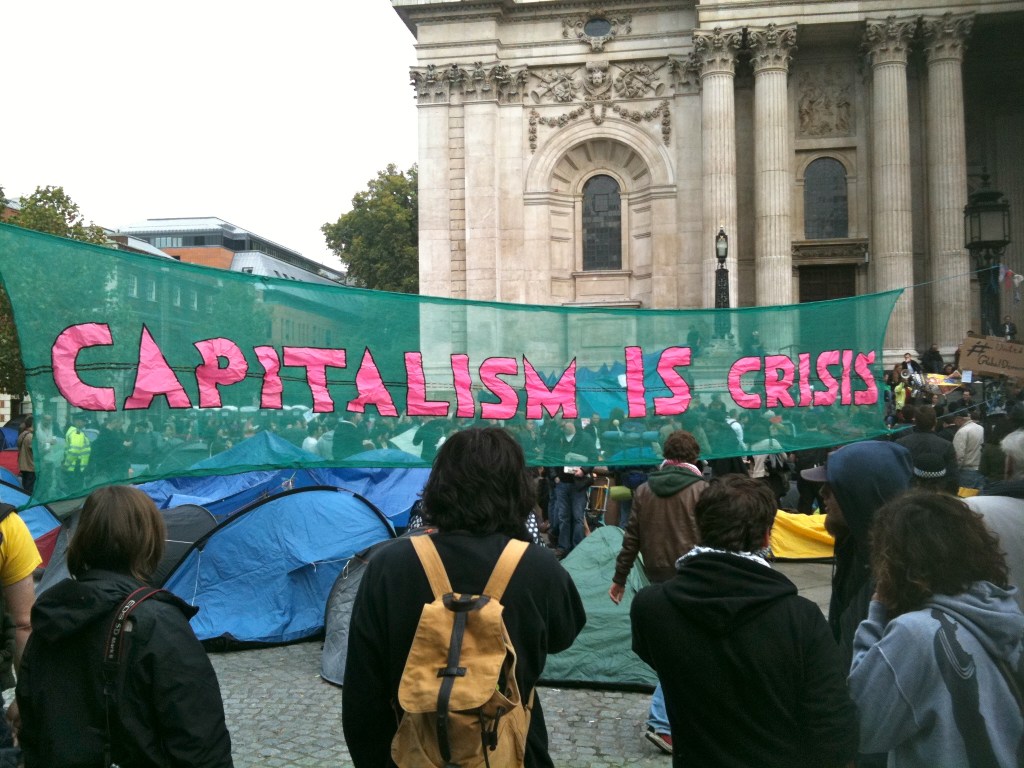The collapse of the Western capitalist model is near certain, and thinkers on both the left and right are stuck in ideological prisons writes Sunny Singh
Capitalism: an economic and political system in which a country’s trade and industry are controlled by private owners for profit, rather than by the state.
Necrocapitalism: a form of capitalism where a country’s trade and industry are founded on, linked to and dependent directly or indirectly on death and the profits accruing from it.
In 2006, I began using necrocapitalism to describe USA’s military-industrial complex and its expansion into sectors as diverse as insurance, medicine, leisure. However, as I traced economic histories, theories and practices, the foundation of our current economic model on slave trade, colonial wealth and yes, death became clearer. Since then, necrocapitalism has evolved to denote wider practices of the current capitalist model. It now seems an apt term to describe an economic model that is collapsing and devouring itself but that given its foundational premise could have had no other end.
Since 2008, it has become evident that the current economic system is not only precarious but inexorably failing. The steady rise – most clearly in the USA and UK – of kleptocracy – rule by those who steal from rest of the nation-state – if not outright kakistocracy – governance by the least qualified and most unscrupulous – is the clearest warning sign yet. However, most economists, financial experts, and those whose trade is money and its organisation, seem incapable of theorising this collapse or new paradigms.
Although this intellectual malaise is global, the formerly colonised, developing economies may be partially exonerated, if only given their relative lack of power and lack of structural resources. This excuse, however, cannot be offered for much of Western Europe and North America, the birthplace of ‘capitalism’ as we know it, as opposed to older forms of trading or economic organisation. The contemporary economic system and its theories are truly a ‘Western product,’ developed over four centuries and inextricably linked with the Enlightenment, slave trade, the colonial enterprise, Industrial Revolution and – over time and until recently – unsurpassed Western global hegemony.
Yet today, Western economic historians, economists, even thinkers interested in economics, on the left and right appear equally trapped in their ideological prisons. The left is tied to simplistic positions of inflated victimhood and guilt and/or dialectics of power, where horrors are inflicted by the elite, the proletariat always suffer, and multicultural hypocrisy functions as a sop for superficial colonial guilt at home just as knee-jerk anti-war rhetoric does abroad.
The rightist view is equally inaccurate as it relies on ahistorical hagiographies of private enterprise, a mythical innate ability of the ‘West’ to innovate and a refusal to acknowledge not only how colonial wealth powered the Industrial Revolution but also how economic hegemony has been maintained after official decolonisation. Here far-right mythmakers such as Scottish historian-ideologue Niall Ferguson stand out for their catchy but flawed analyses. Ferguson’s ‘six killer apps of Western power’ – competition, science, property rights, medicine, consumerism and the work ethic – are a particularly egregious example of such fact-free, ahistorical thinking.
The right also suffers from free-market fundamentalists who insist that markets can regulate themselves, even organise themselves better without political intervention and manipulation. For better or worse, economics and politics are inextricably interlinked, and there is little evidence to suggest that a complete delinking of these is desirable or possible. Moreover, even the capitalist model has never actually seen free markets in any form. Even today, this is often a euphemism for discreet – and mostly private rather than state – control or influence of the markets, both in the West and more importantly, farther afield across the globe.
Here it is necessary to note that most theories –on the right and left –emerged firmly from the postcolonial era (as in after the start of the European colonial enterprise), once Western societies had benefitted substantially from their colonial acquisitions and operations. Regardless of whether one sees the early days of mercantilism as an early stage of capitalism or not, the assumption that wealth, sourced for Europe from abroad, could be gained at relatively low cost – as proven by the very profitable Slave Trade and extraction of resources from the colonies – was established as a foundational, albeit not necessarily explicit principle of Western economic philosophy.
Key philosophers throughout the 18th and 19th centuries not only benefited from the economics of slave trade and colonialism, but took it so much for granted as to not often take them into significant account. This lacuna has been exacerbated over time, even as the ramifications of ignoring these factors have grown more severe.
For example, many contemporary analyses of mercantilism ignore the role of the colonial enterprise including slave trade in this early stage of capitalism. They follow Francis Bacon’s pattern of willful denial of the foundations of Western economic organisation in this period. So when Bacon explains that the purpose of mercantilism is “the opening and well-balancing of trade; the cherishing of manufacturers; the banishing of idleness; the repressing of waste and excess by sumptuary laws; the improvement and husbanding of the soil; the regulation of prices…”, the implicit assumption remains that these goals are limited to one’s own state, and society, and only applicable to fellow European slaver and colonialist states!
In the intervening centuries, this view has continued to underpin Western economic philosophies, implicitly but clearly building global economic structures on an unchallenged right to access resources of the non-European and premised on controlling their territories and resources in perpetuity. Instead of any ‘killer apps,’ Western capitalism is based on three foundational principles:
- Access to resources – material and human – at preferential, low cost;
- Captive markets for the goods being produced;
- An artificially limited number of competitors.
Simply, the capitalist structure assumes that European/Western ‘producers’ can not only access resources at below market prices thanks to the colonies and slavery but also – over time – and increasingly, after the Industrial Revolution, have access to captive colonial markets. By limiting competition at both production and sale points, Western capitalism could proceed in the belief that not only were resources infinite, but so was wealth creation (at least at home). This was made easier as the price for this wealth creation was – and still is – paid in lands far removed from ‘home’.
However, take away these three historical advantages – under-priced resources, captive markets and limited competition – and the Western capitalist model collapses. An early example which failed to register was the closing of the UK’s cotton mills. Once the captive markets were lost and with no colonies to supply under-priced cotton, there was neither room for overpriced British textiles, nor indeed the resources to subsidise overpriced production. Another was the closure of Britain’s coal mines which became unsustainable once imperial advantages were removed. The current US rage about the decline of the manufacturing sector has a similar root. The white ‘proletariat’ at home were complicit before; they are now enraged at having to give up their ‘innate’ competitive advantage.
Once colonies could not be held formally, most former colonisers attempted an economic sleight of hand. A series of cartel-like international trade decisions were taken despite official decolonisation in order to maintain an indefinite economic hegemony. The current international ‘multilateral’ trading system is predicated on maintaining historic imbalances, and has been enforced since the end of the Second World War via a number of different methods. These involve multilateral Western-led institutions such as the World Bank and the International Monetary Fund. Other lesser-known mechanisms include multi-tiered oil pricing and exclusivity of the petrodollar, set up primarily by the post-World War II Western coalition.
In practice, this post-war order meant that decolonising nations were deliberately fettered by the exclusive use of the US dollar for oil trade. Former colonies, already impoverished by colonial depredations, were forced to acquire dollars, often by selling low-end products or raw materials to Western markets. The dollars were then recycled to purchase petrol intended to drive industrial growth. This economic double-bind ensured that development was doubly difficult for the newly decolonising states. Indeed, a major global shift of the past three decades – perhaps a corollary of USA’s ‘end of history’ hubris of the 1990s – has been the loosening the dollar’s monopoly on oil trade.
The post-war order required a combination of political and economic policies to ensure that the former colonies were maintained in poverty, incapable of challenging existing hegemonies, continuing to serve only as sources for cheap raw materials and markets. This time for a transnational bloc of ‘free’ Western states– instead of specific colonial nations competing against each other. This arrangement was not too different from the cartel-like set-ups of the earlier mercantilist era. In principle, former colonies were allowed to develop the ability to consume to a certain point, often aided by international loans and ‘aid.’ At the same time, as the production costs rose at home, former colonies could also continue to provide cheap labour.
This model, however, rested on the same aforementioned assumption: that captive markets, cheap resources and limited competition can be maintained in perpetuity.
Corollaries of this post-war, and postcolonial order included the idea of a united Europe, intended to address its diminishing colonial might, the passing of the imperial torch to USA, and most recently, the ideal of ‘globalisation’ which was meant to maintain and extend Western hegemony.
In principle and practice, today’s Asian sweatshops are little different from earlier colonial era industries except in one major aspect: ‘globalisation’ in the wake of decolonisation, has opened the door for new players from the former colonies, who are disrupting the three key assumptions. So markets have expanded in the global south – but can no longer be held captive. Cheap sourcing of raw materials – both material and human – has grown ever more tenuous, and an increasing number of national, corporate and individual competitors are destabilising an already unstable model.
These challenges grow more significant with each passing day. Moreover, economic and political policies are not disconnected, and some of the strongest challenges to Western economic hegemony are being posed by a combination of the two. One such challenge was mounted in the 1990s, with China and India playing significant roles in the finalisation of climate change agreements and in the World Trade Organisation. Over the years, and despite the global economic ‘malaise’, such challenges from the emerging economies of former colonies have only grown, and in tandem with an inexorable European decline and an increasingly dysfunctional USA. However, just as the relative silence around the role of the colonial enterprise in the development of Western capitalist structures has ensured flawed analysis in the past, its continued and willful disregard ensures that contemporary analyses of capitalism retain the lacuna.
For too long now, Western politicians have colluded in maintaining this flawed economic model, even when the arithmetic stopped making sense. Europe’s social welfare states are founded on this perpetual hegemony, and (ex)-colonial profit and advantage. Meanwhile, the US, a relative newcomer to the game of empires, is struggling to maintain its economic advantage at home and abroad even as its populace grows more restive. Both are attempting to buy out their populations with unsustainable dreams of prosperity.
So, what next? The collapse of the Western capitalist model is near certain. There is also little evidence that should – and when – the economic centres shift to the global south, the new leaders will abide by the economic model as we know it. There may be familiar elements in whatever system that evolves but we must shed outdated theories, especially when they ignore the implicit foundations of today’s necrocapitalist model.
At the same time, given human tendencies for trading, our motivations for profit, improvement, and yes, greed, there is little reason to believe that another system that provides for competition, survival and expansion will not replace the current one. While there is no clear indication of what this new structure may be, there is need for new theoretical edifices. This essay is intended as one tiny brick of that future project.
 If you enjoyed this, and want more like it, then please consider making a donation, it can be anything from £2 and takes no time at all. Or give what you can afford from £2 per month and become an MD member.
If you enjoyed this, and want more like it, then please consider making a donation, it can be anything from £2 and takes no time at all. Or give what you can afford from £2 per month and become an MD member.
Sunny Singh was born in Varanasi, India and studied at Brandeis University (USA), Jawaharlal Nehru University (India) and University of Barcelona (Spain). She has published three critically acclaimed novels and a non-fiction work on single women in India. Now based in London, she teaches creative writing at the London Metropolitan University. In 2016, she co-founded the Jhalak Prize to celebrate British writers of colour. An expert on Bollywood, her book on the Indian superstar Amitabh Bachchan will be published by BFI/Palgrave in November 2017. More information on her writing can be found at: sunnysingh.net Tweet her @sunnysingh_n6
All work published on MD is the intellectual property of its creators, and requires permission to be republished. Contact us if you have any questions.










Leave a reply to tolsarose Cancel reply